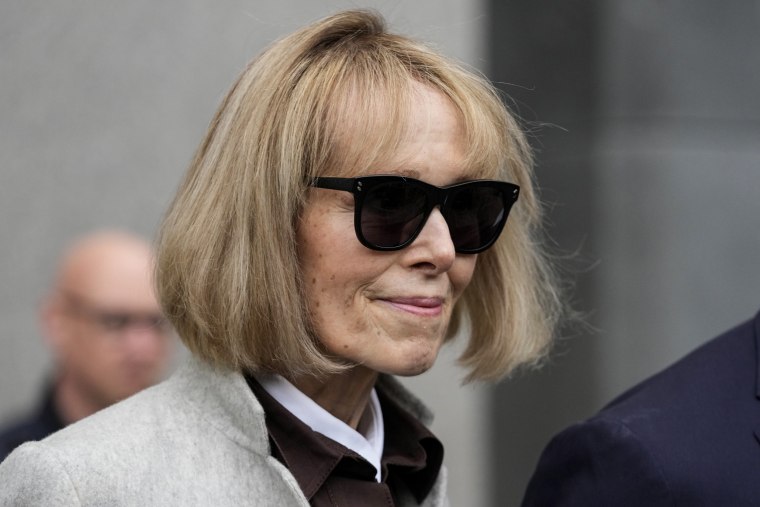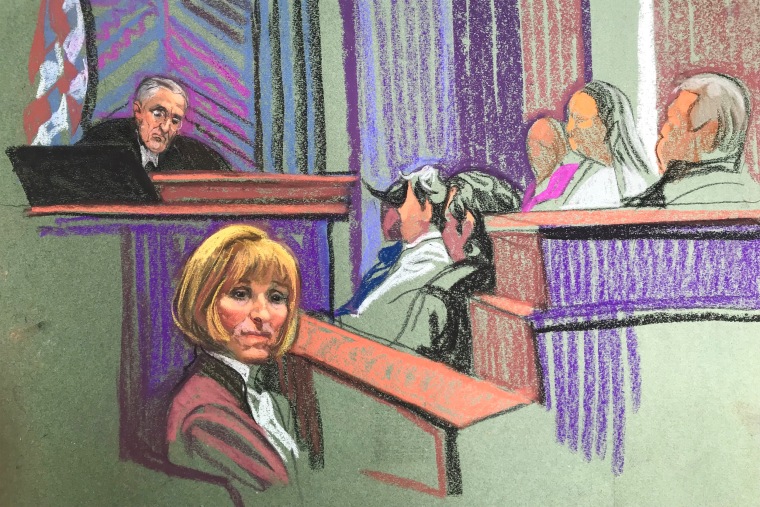On Tuesday, I walked into the Daniel Patrick Moynihan federal courthouse in Manhattan, a gleaming marble tower where this lawyer-turned-journalist spent considerable time over the last 20 years — but never quite like this.
That's because the opening statements in the civil trial for writer E. Jean Carroll’s defamation and battery lawsuit against Donald Trump were unlike anything I’ve seen in a federal courthouse. It was a searing, vivid account of a nearly 30-year-old alleged sexual assault that could easily devolve into a “he said/she said” but for intrepid lawyering, fortuitous photos and videos, and Trump’s own spigot of speech.
While legendary litigator Roberta Kaplan has been the face of Carroll’s case, there are several other, less visible lawyers on her team with serious trial chops. And Carroll began her case with one of them, a woman named Shawn Crowley, who not only spent several years as a prosecutor in the same courthouse, but also was a law clerk to Judge Lewis Kaplan, who is presiding over the trial.
Carroll, born in 1943 and raised to 'grin and bear it,' chose silence, Crowley alleged, until 'silence became impossible.'
Crowley started with the basic allegations: Trump sexually assaulted Carroll in the mid-1990s in a department store dressing room while on a shopping trip to find a gift for a woman Trump knew.
When Carroll confided in two friends shortly thereafter, they gave her opposite advice, Crowley alleged. One allegedly explained to Carroll that she had been raped and urged her to call the police. Days later, the other friend allegedly warned that Trump would “ruin her life and her career” if she spoke.
Carroll, born in 1943 and raised to “grin and bear it,” chose silence, Crowley alleged, until “silence became impossible” in the wake of The New York Times’ Harvey Weinstein reporting, which set in motion the #MeToo movement.

Having newly embarked on a book project about women’s experiences with men, Carroll was forced to re-examine her own life experiences and ultimately wrote not about others, but about herself. And she finally confronted a trauma long buried: the alleged assault by Trump, which she included in that book and in an excerpt published in June 2019 in New York magazine.
But after she came forward, Trump’s “explosive” response, a denial that claimed Carroll was “not my type” (or code for “she was too ugly to assault,” as Crowley put it), made her a target for online attacks and then unraveled her career as an advice columnist.
Crowley made clear that she was “proud to represent” Carroll and help clear her name. And while maintaining that the jury could hold Trump liable on the basis of Carroll’s testimony alone, she insisted this case is not a “he/said, she/said” because so many other witnesses can — and will — corroborate her account.
Crowley was calm but firm, insistent yet relatable. Her opening was like an invitation to the jury to examine the rings of a tree.
Those witnesses include the assistant manager and chief of operations at Bergdorf Goodman in the mid-90s, who Crowley said can confirm key details about the store and why no one saw Carroll and Trump on the night of the alleged assault; Carroll’s sister, who Crowley said can explain why, given their shared, rural Indianan upbringing, Carroll’s decades-long silence is unsurprising; two experts who are expected to opine on the psychological and reputational impact on Carroll; and of course, the two friends to whom Carroll revealed the alleged assault in real-time.
At all times, Crowley was calm but firm, insistent yet relatable. Her opening was like an invitation to the jury to examine the rings of a tree. At the center, there is Carroll’s own narrative. One ring beyond are all the people who say they can back up Carroll’s own account. And finally, she outlined the case’s outer-most ring: the testimony of two other women, Jessica Leeds and Natasha Stoynoff, who have alleged Trump sexually assaulted them too in 1979 and 2005 respectively. (Trump has vehemently denied the allegations.)
And that’s where Crowley’s opening went from compelling to can’t-look-away: She wove the stories of Carroll, Leeds and Stoynoff into “three women, one pattern,” all of which she said tracks Trump’s own statement on the infamous "Access Hollywood" tape. (The court has already ruled that Carroll can introduce that tape as evidence.)
In each of the cases, Trump lied, denying the assault, Crowley said, before demeaning the accuser as “not his type.” The problem, of course, is that Carroll was exactly his type.
Referencing that tape, Crowley continued, “He thought no one was listening,” but it was “not locker room talk.” Instead, she asserted, the tape describes exactly what Trump did to each of them: Forcibly kiss without consent, grab, grope, and “do anything” because he was a “star.”
And in each of the cases, Trump lied, denying the assault, Crowley said, before demeaning the accuser as “not his type.” The problem, of course, is that Carroll was exactly his type. How do we know, she asked? Because there is photographic proof that he met Carroll at an event in the late 1980s.
Crowley then put that photo up on a screen for all present to see, showing Carroll, now an elegant 79, in her mid-40s, all bouncy hair, shining eyes and gleaming teeth. And Crowley then revealed that at Trump's deposition, the former president testified, under oath, that Carroll was Marla Maples, his second wife, who he has said was exactly his type.

Before she finished, Crowley reminded the jurors: This isn’t a criminal case. All they have to decide is whether he was lying in his October 2022 post on Truth Social, in which he called her story a “hoax and a lie,” and is it more likely than not that he assaulted her? And Crowley assured the jury that Carroll’s team would show them how the evidence supports only one conclusion: that Trump is liable for both defaming Carroll and assaulting her.
On Wednesday morning, Carroll’s team will start their case in earnest with witness testimony. Will they deliver what they’ve promised? And can their witnesses withstand the withering cross-examinations Trump lawyer Joe Tacopina committed to in his opening on Tuesday? (For more on Tacopina's opening statement, check out my Twitter thread here.)
I’ll be in the courtroom for the action. Stay tuned.
